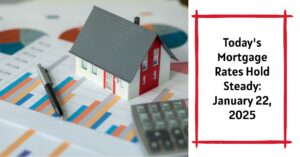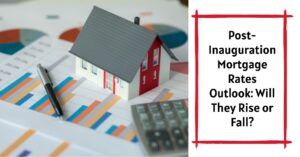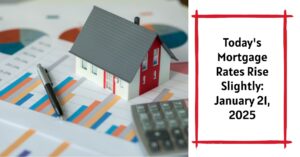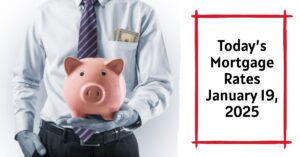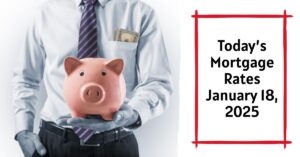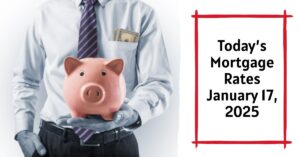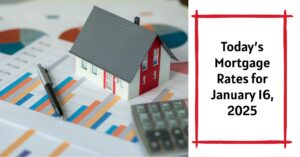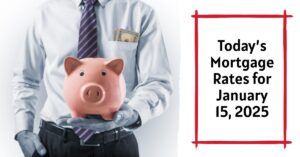On January 22, 2025, today's mortgage rates hold steady near 6.70%, continuing to reflect a reluctance to drop significantly amid ongoing inflation concerns. Early forecasts had suggested a potential decline in mortgage rates this year, but they have remained stubbornly high due to various economic factors that influence the housing market.
Today's Mortgage Rates – January 22, 2025: Rates Remain Steady at 6.70%
Key Takeaways
- Current Average Rate: 6.70%
- Inflation's Role: Ongoing inflation is inhibiting significant rate drops.
- Future Outlook: Experts predict higher volatility and uncertainty in rate changes.
- Date of Data: Accurate as of January 22, 2025, from Zillow.
Understanding today's mortgage rates is essential for home buyers and homeowners considering refinancing. The following sections delve deeper into recent trends, economic influences on rates, and the types of mortgage options available.
What Are Today's Mortgage Rates?
Mortgage rates can fluctuate based on various economic and market conditions. According to Zillow's latest data, average mortgage rates stand as follows:
| Mortgage Type | Average Rate Today |
|---|---|
| 30-Year Fixed | 6.66% |
| 20-Year Fixed | 6.61% |
| 15-Year Fixed | 5.97% |
| 7/1 ARM | 6.72% |
| 5/1 ARM | 6.66% |
| 30-Year FHA | 6.29% |
| 30-Year VA | 6.01% |
This data illustrates the slight variations in rates depending on loan types. The 30-year fixed-rate mortgage remains the most popular option, allowing borrowers to stretch out payments over a longer period while maintaining a consistent interest rate.
Economic Influences Affecting Mortgage Rates
The state of the economy and geopolitical events significantly impact mortgage rates. Inflation has been a critical topic, as economists and the Federal Reserve work to stabilize prices. Here are some key points to consider regarding inflation's impact on mortgage rates:
- Stickiness of Inflation: While inflation rates have decreased from their peaks, they remain above the Federal Reserve's target of 2% as of January 2025. This persistent inflation prevents substantial reductions in interest rates, leading to concerns about ongoing affordability in the housing market.
- Market Reactions: Financial markets respond quickly to inflation data, with fluctuations often reflecting investor expectations regarding interest rates. If inflation remains high, the Federal Reserve may continue to pause on potential rate cuts, affecting how lenders calculate mortgage interest.
- Political Factors: Recent discussions surrounding potential inflationary policies under a newly elected administration could further complicate the rate landscape. Should tariffs or other measures be implemented, the added costs may ultimately be passed down to consumers in the form of higher mortgage rates.
Refinance Rates Today
For homeowners contemplating refinancing their existing mortgages, it is crucial to understand the current refinance rates available. As of today, refinancing options reflect slightly different terms:
| Mortgage Refinance Type | Average Rate Today |
|---|---|
| 30-Year Fixed Refinance | 6.69% |
| 20-Year Fixed Refinance | 6.19% |
| 15-Year Fixed Refinance | 5.94% |
| 7/1 ARM Refinance | 6.25% |
| 5/1 ARM Refinance | 6.61% |
| 30-Year VA Refinance | 6.07% |
Homeowners should evaluate if refinancing makes sense based on their potential savings versus closing costs. It’s advisable to consider refinancing primarily if the new rate offers a reduction of at least one percentage point from the current market rate.
Recommended Read:
Mortgage Rates for January 20, 2025: Trends and Insights
Post-Inauguration Mortgage Rates Outlook: Will They Rise or Fall?
Future Outlook: Will Mortgage Rates Go Down?
What lies ahead for mortgage rates in 2025? While many forecasters initially believed mortgage rates would decrease significantly this year, recent trends portray a more difficult situation. The current outlook suggests:
- Gradual Easing on Rates: Experts anticipate that as inflation begins to stabilize, mortgage rates may gradually ease, potentially reaching around 6.5% to 6.3% by the end of 2025.
- Volatility and Risk: Analysts project that while rates may trend downwards, they expect periods of volatility. Factors such as economic shocks, government policies, and consumer sentiment will heavily influence rates throughout the year.
- Long-Term Expectation: The housing market is likely to remain financially tight with high mortgage rates constraining homebuying possibilities. Even modest reductions may not suffice to stimulate significant buying activity, reflecting the ongoing affordability challenge faced by many prospective homeowners.
Analysis of Mortgage Options
Understanding various mortgage options is a fundamental step for buyers in making informed decisions. Here’s a brief overview of some popular types of mortgages:
- 30-Year Fixed-Rate Mortgage: This option grants borrowers the advantage of predictable monthly payments across three decades, making budgeting easier. However, the trade-off is that they generally incur higher interest rates than shorter-term loans.
- 15-Year Fixed-Rate Mortgage: This mortgage type offers a quicker payoff timeframe, leading to lower total interest paid. Although the monthly payments are higher, many choose this option for long-term savings on interest.
- Adjustable-Rate Mortgages (ARMs): ARMs can provide lower initial rates compared to fixed-rate mortgages. However, borrowers need to consider that once the initial fixed period concludes, rates could increase significantly depending on the market environment.
Conclusion on the State of the Mortgage Market
In closing, January 22, 2025, sees mortgage rates hovering around 6.70%, with a backdrop of ongoing economic uncertainty and inflationary pressures. The forecast remains unclear, with some experts suggesting gradual decline within the year amidst fluctuating conditions.
For those looking to buy a home or refinance, the current landscape underscores the importance of informed decision-making. By assessing current rates, understanding economic factors, and evaluating different mortgage options, consumers can position themselves effectively in this challenging market.
Work with Norada in 2025, Your Trusted Source for
Real Estate Investing
With mortgage rates fluctuating, investing in turnkey real estate
can help you secure consistent returns.
Expand your portfolio confidently, even in a shifting interest rate environment.
Speak with our expert investment counselors (No Obligation):
(800) 611-3060
Recommended Read:
- Mortgage Rates Forecast for the Next 3 Years: 2025 to 2027
- 30-Year Mortgage Rate Forecast for the Next 5 Years
- 15-Year Mortgage Rate Forecast for the Next 5 Years
- Why Are Mortgage Rates Going Up in 2025: Will Rates Drop?
- Why Are Mortgage Rates So High and Predictions for 2025
- NAR Predicts 6% Mortgage Rates in 2025 Will Boost Housing Market
- Mortgage Rates Predictions for 2025: Expert Forecast
- Will Mortgage Rates Ever Be 3% Again: Future Outlook
- Mortgage Rates Predictions for Next 2 Years
- Mortgage Rate Predictions for Next 5 Years
- Mortgage Rate Predictions for 2025: Expert Forecast
- Mortgage Rate Predictions: Why 2% and 3% Rates are Out of Reach
- How Lower Mortgage Rates Can Save You Thousands?
- How to Get a Low Mortgage Interest Rate?
- Will Mortgage Rates Ever Be 4% Again?
